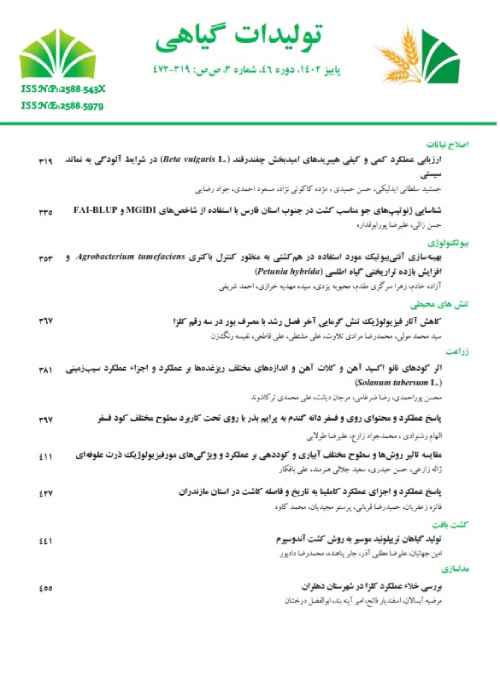The Impact of Pseudomonas putida and Chemical Phosphorus Fertilizer on Some Vegetative, Reproductive and Biochemical Characteristics of Two Species of Basil (O. sanctum L and O. basilicum var. thyrsiflora)
Ocimum basilicum L. (O. basilicum) or sweet basil belongs to the family Lamiaceae which has been used as a medicinal plant and its essential oils are used to flavor foods, in dental and oral products and in fragrances. One of the methods to increase yield and availability of minerals in the soil, with the decreased use of inorganic fertilizers, is to apply biological fertilization, which also affects the essential oil of aromatic plants. Hence, this study was carried out to describe detailed growth and chemical investigation of basil essential oil affected by chemical and biological fertilization.
This study was carried out as factorial based on completely randomized design with three replications. The first factor involved plant (O. basilicum var. Thyrsiflora and O. sanctum.L ) and the second factor was fertilizer types (0%, 50% and 100% of the plant phosphorus requirement, only bacteria, bacteria with 50% of plant phosphorus requirement, bacteria with 100% of plant phosphorus requirement). The pots filled with five kilograms of soil. Phosphorus fertilizer was added to the pots from the triple super phosphate source based on the experimental treatments. Overnight culture of Pseudomonas putida in nutrient broth was prepared and applied under each seed. At full bloom stage, the leaves and inflorescences of each plant were completely separated and their number counted. Extraction of leaf samples was performed using 70% methanol solvent to measure phenolic compounds and the flavon and flavonol content of the extract was read by measuring the absorbance at 425 nm. The amount of phosphorus content of plant leave was also determined.
Shoot dry weight, number and length of inflorescence were significantly (p<0.01) affected by the interaction effect of fertilizers and plant species. The highest shoot dry weight, number and length of inflorescence were recoded with only bacteria without the use of phosphate fertilizer treatment and followed with samples treated with bacterial + 50% chemical fertilizer. The maximum phosphorus concentration in both basilicum and sanctum leaves (4.92 and 4.82 mg g-1 dry weight, respectively) and phenols, flavonoids and flavonoid compounds were obtained in treatments containing only bacteria without using phosphate fertilizer and followed with samples treated with bacterial + 50% chemical fertilizer, as well. The highest percentage inhibition of free radicals was recorded in basilicum and sanctum (67 and 75 percent respectively), in the presence of the bacteria without using phosphorus fertilizer. Applied bacterium in this research improved the quantity and quality of basil, thus to recommend it as a biological fertilizer considering its potential needs to be examined at farm conditions.
According to the results, using biofertilizer in this research reduced the demand for phosphorous fertilizer and improved the quantity and quality of basil; so as a result to recommend it as a biological fertilizer considering its potential needs to be examined at farm conditions.
- حق عضویت دریافتی صرف حمایت از نشریات عضو و نگهداری، تکمیل و توسعه مگیران میشود.
- پرداخت حق اشتراک و دانلود مقالات اجازه بازنشر آن در سایر رسانههای چاپی و دیجیتال را به کاربر نمیدهد.


